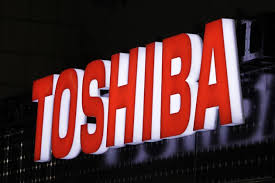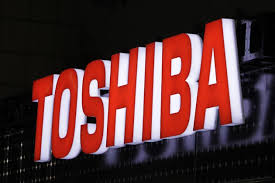
Concerns over how fast the Japanese conglomerate Toshiba Corp can plug a multi-billion-dollar balance sheet hole left by the collapse of its U.S. nuclear business were raised after stalling of the company’s talks to sell its prized memory chip business.
Toshiba is the world's second-largest maker of NAND chips after Samsung Electronics Co Ltd. and its chips and devices business accounted for roughly a third of its sales in the last financial year.
But what's going on with Toshiba's memory chip sale?
In order pay down debt and cover the impact of a $6.33 billion writedown and liabilities linked to U.S. nuclear arm Westinghouse, Toshiba said early this year that it would sell its chip business which the shareholders approved in March.
A consortium including Japanese government-backed funds, private equity firm Bain Capital and South Korean chip maker SK Hynix was picked as a preferred bidder in June by Toshiba.
But arguing it needs to consent to a sale, Toshiba has been taken to court by Western Digital, which jointly invests in Toshiba's main chip plant and is a rival bidder.
And now demanding that Toshiba resolve the conflict before the sale, the battle has unnerved the state-backed funds. Another point of contention is the step that would that could eventually give SK Hynix an equity interest if its proposal to help fund the deal with convertible bonds is finalized and approved. It is not desired that SK Hynix to gain a management stake, by the Japanese funds.
In the last fiscal year, nuclear losses drove Toshiba’s net worth to a negative 582 billion yen ($5.25 billion). the company estimates.
A delisting from the Tokyo Stock Exchange would be prompted if there is a reporting negative net worth - liabilities exceeding assets - for the second year running.
And if the company wants to be sure to close the deal by the end of the fiscal year in March, analysts say the company needs to reach a deal in weeks - rather than months given regulatory approvals for any chips sale are likely to take at least several months.
Additionally, if auditor PricewaterhouseCoopers Aarata does not endorse its financial results for the last fiscal year by an Aug. 10 deadline, Toshiba could also be forced to delist.
A non-endorsement by its auditor would increase chances of a delisting, although the decision is up to the bourse even as Toshiba has already been demoted from the bourse's main board.
Whether Toshiba needed to recognize losses at Westinghouse earlier, rather than in December last year, PwC has queried.
The disposal becomes less urgent if it is delisted before a chips sale is completed.
But Toshiba’s competitiveness. Would be jeopardized as it could further complicate Toshiba's ability to raise money from markets or banks, in particular to feed its cash-hungry memory-chip business.
As a result of the 2015 scandal, Toshiba is already barred from issuing equity.
While even camera maker Olympus averted one in 2012, following a scandal around hidden losses, delisting of Toshiba would be the first major delisting for over a decade.
(Source:www.reuters.com)
Toshiba is the world's second-largest maker of NAND chips after Samsung Electronics Co Ltd. and its chips and devices business accounted for roughly a third of its sales in the last financial year.
But what's going on with Toshiba's memory chip sale?
In order pay down debt and cover the impact of a $6.33 billion writedown and liabilities linked to U.S. nuclear arm Westinghouse, Toshiba said early this year that it would sell its chip business which the shareholders approved in March.
A consortium including Japanese government-backed funds, private equity firm Bain Capital and South Korean chip maker SK Hynix was picked as a preferred bidder in June by Toshiba.
But arguing it needs to consent to a sale, Toshiba has been taken to court by Western Digital, which jointly invests in Toshiba's main chip plant and is a rival bidder.
And now demanding that Toshiba resolve the conflict before the sale, the battle has unnerved the state-backed funds. Another point of contention is the step that would that could eventually give SK Hynix an equity interest if its proposal to help fund the deal with convertible bonds is finalized and approved. It is not desired that SK Hynix to gain a management stake, by the Japanese funds.
In the last fiscal year, nuclear losses drove Toshiba’s net worth to a negative 582 billion yen ($5.25 billion). the company estimates.
A delisting from the Tokyo Stock Exchange would be prompted if there is a reporting negative net worth - liabilities exceeding assets - for the second year running.
And if the company wants to be sure to close the deal by the end of the fiscal year in March, analysts say the company needs to reach a deal in weeks - rather than months given regulatory approvals for any chips sale are likely to take at least several months.
Additionally, if auditor PricewaterhouseCoopers Aarata does not endorse its financial results for the last fiscal year by an Aug. 10 deadline, Toshiba could also be forced to delist.
A non-endorsement by its auditor would increase chances of a delisting, although the decision is up to the bourse even as Toshiba has already been demoted from the bourse's main board.
Whether Toshiba needed to recognize losses at Westinghouse earlier, rather than in December last year, PwC has queried.
The disposal becomes less urgent if it is delisted before a chips sale is completed.
But Toshiba’s competitiveness. Would be jeopardized as it could further complicate Toshiba's ability to raise money from markets or banks, in particular to feed its cash-hungry memory-chip business.
As a result of the 2015 scandal, Toshiba is already barred from issuing equity.
While even camera maker Olympus averted one in 2012, following a scandal around hidden losses, delisting of Toshiba would be the first major delisting for over a decade.
(Source:www.reuters.com)














